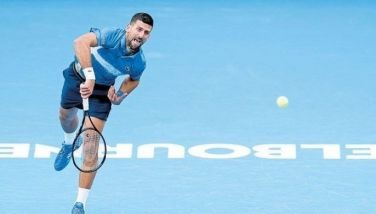Media misses the beat / Remembering Sandra
March 1, 2004 | 12:00am
The Philippine media enjoys the reputation of being the freest in Asia, a bare-knuckled press that fears "nothing" and reports "everything". Where before, Plaza Miranda was the ultimate vehicle in determining whether a political concept or idea could work or not, today it is media. The late President Ramon Magsaysay it was who popularized Plaza Miranda. Often The Guy asked: "Will that play in Plaza Miranda?"
And so the swirl of people and politicians often led to Plaza Miranda for the debate to end debates.
Even Ferdinand Marcos, for all his imperious command of the news and communications network, worked his baritone best in this small piece of real estate fronting the Quiapo Church. Ninoy Aquino, too, was scheduled to cast his spell on that teeming opposition Plaza Miranda throng August 21, 1971 when a flock of grenades exploded on the stage where all the Liberal Party luminaries rained insult and invective on the future dictator. Pandemonium broke loose as opposition victims crumpled on the stage.
Till today, nobody really knows who masterminded the Plaza Miranda massacre. A thousand fingers have been pointed but the documentation isn’t just there. Was it President Marcos? Was it the CPP-NPA?
Anyway, today media is king. Since the ’60s and the ’70s the press has grown and grown like Jack’s legendary beanstalk. Where before print media lorded it over everybody (and still does at times), it is the so-called broadcast media, television particularly, which dominates the airwaves with the awesome power of an invading air armada. I read the newspapers and magazines for the more serious stuff. But it is TV that often assails and overpowers my senses. And it is here that I draw the line and ring the alaarum bells.
TV, and I do not exclude print media, reports the news, the bare news and not much else.
Otherwise, we – 83 million Filipinos – are waylaid and bushwhacked. We are sucked into a vast, arid, mammary wasteland of reportage or pseudo-reportage where the glitter of personalities, the phoney pomp of garish event and circumstance, often the stupid, vapid, utterly dim-witted statements and declarations of presidential aspirants and leading politicians, bristle into panoramic view with the audio-visual impact of the Second Coming.
Who really cares if Loren Legarda sports the latest body-sheathe of Valentino? Will the world tilt on its axis if Fernando Poe Jr. is repeatedly chracterized as honest and sincere, who piled his movie fortune through hard work? Is posterity served? Is historical truth spun like a golden coin if Raul Roco is reported as a wife-beater and a tantrum-tosser? Who honestly cares if Ping Lacson repeatedly pounds the drums he will restore unity to the opposition and peace to this confounded earth of ours? If Luneta teems with a million people (some say 2.8 million) during a rally of Brother Eddie, does that translate into a gospel flood of votes and we must therefore ejaculate the Beatitudes? And why bother at all with this Ed Gil, who is nothing but pathetic mumbo, jumbo and dumbo?
Media misses the essential point in a presidential campaign.
Its task is not only to supply the news. Its bigger task is to inform and explain. Breaking news comes in the shape of bare bones. Media must wrap these bones in ample flesh, give them a heart, a pair of legs, a pair of lungs, a spinal column. Here I quote that great journalist Walter Lippmann who said "The press must give the public not only what it wants but what it will learn to want." Media must embellish the news with background, perspective, historical roots, analytical depth.
Let us all remember John Milton‚s Aero-pagitica where he said, "Truth must have more shapes than one." How true, how true. And the philosopher Will Durant added that truth has a left leg and a right leg too. So where does truth ultimately go? Like a flood where the facts multiply by the day, to "rivers of fact", before it gullies into "streams of opinion". And that’s where the trained and experienced journalist comes in. But his or her opinion can only ring a big bell if this journalist knows his history, has had a fling at the classics, is experienced with the throb of contemporary politics, has a feel for the treacherous range of geopolitics, and so on.
In the old days, top journalists of this genre were not rare.
There were Vicente Albano Pacis, Carlos P. Romulo, Modesto Farolan, Jose A. Lansang, Indalecio Soliongco, Fatso Intengan, Armando Malay, Pete Padilla, S.P. Lopez, Renato Constantino et al., each of whom left a bit of his legacy on this columnist. They were learned men, who could dig deep and eloquently into history. They were ideologues of the left, center, as well as of the right, who could quote Shakespeare, William James, as well as Marx, Aristotle and the Shavians.
Often their prose and their thoughts danced on my young mind like little licks of blue flame. Alas, none of their kind exist any more.
Often media, particularly television, tilts toward entertainment when it should be compelled by the muses of journalism, to weave more webs of analytical information, documentaries, historical narrative. It should intelligently discuss issues, issues, issues. Don’t get me wrong. I too like entertainment. And many of my friends guffaw when I tell them I enormously enjoy Clint Eastwood, Tom Cruise, Nicole Kidman and yes Judy Ann Santos (Juday), and every now and then replays of the Panday himself, his Movie Enormity FPJ, Da King no less.
This too became an issue in the US, and remains an issue. Where to draw the line between information and entertainment? What was more important? George Kennan testifying before the Senate on Vietnam or a re-run of I Love Lucy? Public Service or Mammon? The Songbird Regine Velasquez, Misalucha or Dolphy or a learned surgical stab on what suits the Philippines better – democracy or dictatorship? StarStruck or a P4. 25 trillion national debt bringing us closer to national bankruptcy?
Nowhere in media today do we have a Horace Greeley, the legendary founder of the Herald-Tribune, who said: " I do no man‚s bidding. I wear no man’s collar."
And yet we in media must soldier on. And we must soldier on despite that mirror on the wall, which tells us implacably we are not the fairest of them all. We must demonstrate – whatever the odds – that we deserve to be free. That we are a bulwark and no despot – nobody – can restrain us.
Sandra Burton. We who lived and worked in the dark and dismal days of the Marcos dictatorship cannot forget her. She came into our ranks silently without the usual blare of a fabled Time correspondent, a sweet and innocent face actually. By ranks I mean the Foreign Correspondents Association of the Philippines (FOCAP) of which I was the founder and resident godfather.
Sandra was one of a kind, a hard and plodding worker, never one to ask overly tough and embarrassing questions. She was about the only one of the corps of American foreign correspondents assigned to Manila who was not singled out for presidential umbrage. In truth, Ferdinand and Imelda Marcos liked very few of the Focap members, but suffered them nonetheless because the couple just couldn’t – try as they did – whip them into any kind of line.
The recalcitrant ones were often invited to Malacañang for ornate four-hour dinners where seduction was elevated to an art particularly by the First Lady. She would gush and tell stories, lavish praise on her guest or guests. At times, Imelda would sing, and here she was almost irresistible. The tough characters that Mr. Marcos could not crack, Imelda often did. A New York Times correspondent, at one time a crackerjack critic of the Palace, fell under Imelda’s charm. That was something.
Sandra Burton just wouldn’t crack, or even pretend she was cracking.
We became good friends, perhaps both of us spoke French, and avoided English when just the two of us were together. It was then, under the spell of the Gallic language, that Sandra would open up with winks and tell-tale smiles and tell his writer what she thought of the Marcoses, and the other luminaries of the dictatorship. Ah, mon Dieu! C’est incroyable! punctuated her wide-eyed narrations whenever she came out with a salacious tale or two.
Sandra is best remembered for her critical reportage on the dictatorship, on the Marcoses, where she was unsparing in narrating the horrors of martial rule. She became an intimate friend and admirer of the Aquinos, Cory and Ninoy (although he was in jail). It was presumably and largely through her reporting that Cory twice landed on the cover of Time magazine. Sandra at 63 was too young to go.
She was that rarity, a sweet and luminous angel of journalism. Adieu, ma chère amie.
And so the swirl of people and politicians often led to Plaza Miranda for the debate to end debates.
Even Ferdinand Marcos, for all his imperious command of the news and communications network, worked his baritone best in this small piece of real estate fronting the Quiapo Church. Ninoy Aquino, too, was scheduled to cast his spell on that teeming opposition Plaza Miranda throng August 21, 1971 when a flock of grenades exploded on the stage where all the Liberal Party luminaries rained insult and invective on the future dictator. Pandemonium broke loose as opposition victims crumpled on the stage.
Till today, nobody really knows who masterminded the Plaza Miranda massacre. A thousand fingers have been pointed but the documentation isn’t just there. Was it President Marcos? Was it the CPP-NPA?
Anyway, today media is king. Since the ’60s and the ’70s the press has grown and grown like Jack’s legendary beanstalk. Where before print media lorded it over everybody (and still does at times), it is the so-called broadcast media, television particularly, which dominates the airwaves with the awesome power of an invading air armada. I read the newspapers and magazines for the more serious stuff. But it is TV that often assails and overpowers my senses. And it is here that I draw the line and ring the alaarum bells.
TV, and I do not exclude print media, reports the news, the bare news and not much else.
Otherwise, we – 83 million Filipinos – are waylaid and bushwhacked. We are sucked into a vast, arid, mammary wasteland of reportage or pseudo-reportage where the glitter of personalities, the phoney pomp of garish event and circumstance, often the stupid, vapid, utterly dim-witted statements and declarations of presidential aspirants and leading politicians, bristle into panoramic view with the audio-visual impact of the Second Coming.
Who really cares if Loren Legarda sports the latest body-sheathe of Valentino? Will the world tilt on its axis if Fernando Poe Jr. is repeatedly chracterized as honest and sincere, who piled his movie fortune through hard work? Is posterity served? Is historical truth spun like a golden coin if Raul Roco is reported as a wife-beater and a tantrum-tosser? Who honestly cares if Ping Lacson repeatedly pounds the drums he will restore unity to the opposition and peace to this confounded earth of ours? If Luneta teems with a million people (some say 2.8 million) during a rally of Brother Eddie, does that translate into a gospel flood of votes and we must therefore ejaculate the Beatitudes? And why bother at all with this Ed Gil, who is nothing but pathetic mumbo, jumbo and dumbo?
Media misses the essential point in a presidential campaign.
Its task is not only to supply the news. Its bigger task is to inform and explain. Breaking news comes in the shape of bare bones. Media must wrap these bones in ample flesh, give them a heart, a pair of legs, a pair of lungs, a spinal column. Here I quote that great journalist Walter Lippmann who said "The press must give the public not only what it wants but what it will learn to want." Media must embellish the news with background, perspective, historical roots, analytical depth.
Let us all remember John Milton‚s Aero-pagitica where he said, "Truth must have more shapes than one." How true, how true. And the philosopher Will Durant added that truth has a left leg and a right leg too. So where does truth ultimately go? Like a flood where the facts multiply by the day, to "rivers of fact", before it gullies into "streams of opinion". And that’s where the trained and experienced journalist comes in. But his or her opinion can only ring a big bell if this journalist knows his history, has had a fling at the classics, is experienced with the throb of contemporary politics, has a feel for the treacherous range of geopolitics, and so on.
In the old days, top journalists of this genre were not rare.
There were Vicente Albano Pacis, Carlos P. Romulo, Modesto Farolan, Jose A. Lansang, Indalecio Soliongco, Fatso Intengan, Armando Malay, Pete Padilla, S.P. Lopez, Renato Constantino et al., each of whom left a bit of his legacy on this columnist. They were learned men, who could dig deep and eloquently into history. They were ideologues of the left, center, as well as of the right, who could quote Shakespeare, William James, as well as Marx, Aristotle and the Shavians.
Often their prose and their thoughts danced on my young mind like little licks of blue flame. Alas, none of their kind exist any more.
Often media, particularly television, tilts toward entertainment when it should be compelled by the muses of journalism, to weave more webs of analytical information, documentaries, historical narrative. It should intelligently discuss issues, issues, issues. Don’t get me wrong. I too like entertainment. And many of my friends guffaw when I tell them I enormously enjoy Clint Eastwood, Tom Cruise, Nicole Kidman and yes Judy Ann Santos (Juday), and every now and then replays of the Panday himself, his Movie Enormity FPJ, Da King no less.
This too became an issue in the US, and remains an issue. Where to draw the line between information and entertainment? What was more important? George Kennan testifying before the Senate on Vietnam or a re-run of I Love Lucy? Public Service or Mammon? The Songbird Regine Velasquez, Misalucha or Dolphy or a learned surgical stab on what suits the Philippines better – democracy or dictatorship? StarStruck or a P4. 25 trillion national debt bringing us closer to national bankruptcy?
Nowhere in media today do we have a Horace Greeley, the legendary founder of the Herald-Tribune, who said: " I do no man‚s bidding. I wear no man’s collar."
And yet we in media must soldier on. And we must soldier on despite that mirror on the wall, which tells us implacably we are not the fairest of them all. We must demonstrate – whatever the odds – that we deserve to be free. That we are a bulwark and no despot – nobody – can restrain us.
Sandra was one of a kind, a hard and plodding worker, never one to ask overly tough and embarrassing questions. She was about the only one of the corps of American foreign correspondents assigned to Manila who was not singled out for presidential umbrage. In truth, Ferdinand and Imelda Marcos liked very few of the Focap members, but suffered them nonetheless because the couple just couldn’t – try as they did – whip them into any kind of line.
The recalcitrant ones were often invited to Malacañang for ornate four-hour dinners where seduction was elevated to an art particularly by the First Lady. She would gush and tell stories, lavish praise on her guest or guests. At times, Imelda would sing, and here she was almost irresistible. The tough characters that Mr. Marcos could not crack, Imelda often did. A New York Times correspondent, at one time a crackerjack critic of the Palace, fell under Imelda’s charm. That was something.
Sandra Burton just wouldn’t crack, or even pretend she was cracking.
We became good friends, perhaps both of us spoke French, and avoided English when just the two of us were together. It was then, under the spell of the Gallic language, that Sandra would open up with winks and tell-tale smiles and tell his writer what she thought of the Marcoses, and the other luminaries of the dictatorship. Ah, mon Dieu! C’est incroyable! punctuated her wide-eyed narrations whenever she came out with a salacious tale or two.
Sandra is best remembered for her critical reportage on the dictatorship, on the Marcoses, where she was unsparing in narrating the horrors of martial rule. She became an intimate friend and admirer of the Aquinos, Cory and Ninoy (although he was in jail). It was presumably and largely through her reporting that Cory twice landed on the cover of Time magazine. Sandra at 63 was too young to go.
She was that rarity, a sweet and luminous angel of journalism. Adieu, ma chère amie.
BrandSpace Articles
<
>
- Latest
- Trending
Trending
Latest
Trending
Latest
Recommended



























